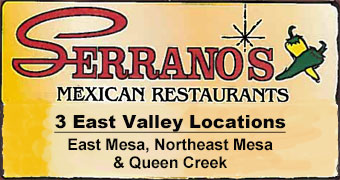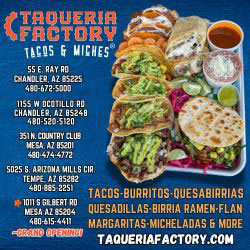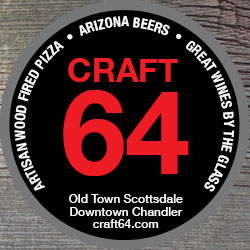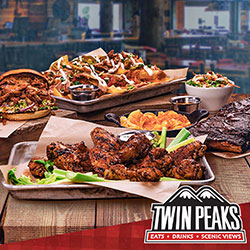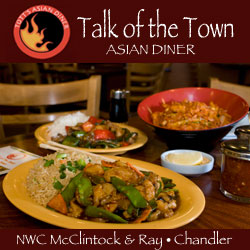Just a few hours after Friday’s shocking announcement that Anheuser-Busch InBev, the world’s largest brewing company, had reached an agreement to acquire Four Peaks, Arizona’s largest craft brewery, Mouth by Southwest sat down with Four Peaks co-founders Jim Scussel and Randy Schultz at their Tempe brewpub to discuss the details and the ramifications of the deal.
MXSW: Congratulations on the deal, guys. How many millions did you say it was worth?
Scussel: ‘‘We didn’t.’’
MXSW: Well, it was worth a try. Let’s start at the beginning. When did AB InBev first approach you, and why did you say yes?
Scussel: ‘‘It was six months ago. We were looking at doing the next phase of Four Peaks. We were ready to go out of state, but it’s daunting right now. With 4,000 breweries, it’s gonna be really hard to compete so we wanted to team up with someone. We looked at a lot of different PE (private equity) firms, a lot of strategic breweries, and AB reached out in July. We interviewed with them, we did due diligence, and it was kind of a no-brainer.’’
MXSW: By due diligence, I assume you talked to people at Goose Island, 10 Barrel, Elysian, and other recent AB inBev acquisitions?
Scussel: ‘‘We did. We went up to Elysian last week and met with those guys. Nothing had changed. The staff was really happy. I mean, it was surprising to me. I figured there’d be some specifics, but it was basically like it was five years ago when I was there. I talked to the staff, and everyone was like, ‘You know what? Nothing’s changed.’’’
MXSW: Nothing at all?
 Scussel (pictured): ‘‘They said, ‘My benefits got better. My 401K got better.’ And the beer got better. That’s the biggest thing. You’ve got the best lab in the world, and the beer is going to improve. I know the big rumor about ‘watered-down’ beers. Those days are gone. AB gets it now. Look at 10 Barrel and all their high-hop beers. They’re making better beers right now, and they’re more hoppy. The whole watered-down thing is just ridiculous.’’
Scussel (pictured): ‘‘They said, ‘My benefits got better. My 401K got better.’ And the beer got better. That’s the biggest thing. You’ve got the best lab in the world, and the beer is going to improve. I know the big rumor about ‘watered-down’ beers. Those days are gone. AB gets it now. Look at 10 Barrel and all their high-hop beers. They’re making better beers right now, and they’re more hoppy. The whole watered-down thing is just ridiculous.’’
MXSW: When this deal closes in 60 days, will you still consider yourselves ‘‘owners’’ or will you simply be hired help?
Schultz: ‘‘We’re reinvesting in our business.’’
MXSW: Did you have to sign a guarantee you’d remain with Four Peaks for a certain amount of time – say, five years – or anything like that?
Schultz: ‘‘We’re not gonna get into the details of what we signed, but we’re not going anywhere.’’
Scussel: (Laughing) ‘‘We could walk anytime, but we’re not. What else am I going to do? Nobody else would hire us.’’
Schultz: (Laughing) ‘‘We had to ‘buy’ our jobs to begin with!’’
MXSW: Let’s look down the road. What should people expect to see two years from now? When a person walks into the brewpub on Dec. 18, 2017, what’s going to be different from today?
 Schultz (pictured): ‘‘The only things that might change will be things for the better. We may have some better chairs – things like that – but in terms of who were are, the people that are running our business, us watching over the business, the customers coming in – nothing will change.’’
Schultz (pictured): ‘‘The only things that might change will be things for the better. We may have some better chairs – things like that – but in terms of who were are, the people that are running our business, us watching over the business, the customers coming in – nothing will change.’’
Scussel: ‘‘AB does not want to come in and tell us what to do. They do not run restaurants. They need us because we run restaurants. So they’re gonna be very cautious about making any changes. Yes, we may do some front-of-the-house revamping, maybe a new paint job or something, but the biggest difference in two years is I hope we’ll have our beers in five or six states.’’
MXSW: So what is your plan for out-of-state distribution?
Scussel: ‘‘First, we’re gonna do California and Nevada. Then Hawaii, which is cool. We’ll start in the West and eventually morph into the Midwest. It all depends on the reception of the beer.’’
Schultz: ‘‘Going back to the person sitting at the bar two years from now, they’re gonna have access to a lot more great beers. With our new access to resources, we’ll be able to do a greater variety of beers, some innovative styles.’’
MXSW: Will that person at the bar be able to order more than Four Peaks beers? Maybe a Budweiser? Or a Goose Island?
Schultz: ‘‘We sell our beers here. We have no plans to change anything we’re doing right now.’’
Scussel: ‘‘In our Scottsdale taproom, we do sell Miller, Coors, Bud…’‘
Schultz: ‘‘We always have there.’’
Scussel: ‘‘Nothing changes. That’s the whole point.’’
MXSW: Back to out-of-state distribution for a minute. When do you expect to see it start to roll out?
Scussel: ‘‘By this fall I would hope to be in California and Nevada and New Mexico. That’s my goal.’’
MXSW: Have you decided which beers you’ll be sending there?
Scussel: ‘‘Yeah, Kilt Lifter, Hop Knot, White Ale, Sunbru, and 8th Street. All the main ones, for sure, but we’ll lead with the Kilt Lifter and Hop Knot.’’
Schultz: ‘‘And some specialty beers.’’
MXSW: Which ones?
Scussel: ‘‘There are four main seasonals: Odelay, Pumpkin Porter, Short Hop, and Lefty’s Lager.
MXSW: How much influence will AB have in deciding what new beers you may brew, or what current beers you may discontinue?
Schultz: ‘‘It’s up to us. We have complete autonomy to grow this brand the way we want to grow the brand. They’re here to help us.’’
MXSW: How much of your beer still will be brewed at your two Tempe brewhouses – Eighth Street and Wilson?
Schultz: ‘‘All of it. We still have huge (production) potential at our Wilson facility.’’
MXSW: So AB will not be brewing Kilt Lifter or Hop Knot like they now brew most of Goose Island’s core beers?
Schultz: ‘‘No. Well, maybe eventually, but there’s no plans for that right now. Everything will continue to be brewed locally.’’
Scussel: ‘‘We can do 30,000 barrels here (at Eighth Street) and we can go up to about 120,000 over there (Wilson) when we get some more equipment. That’s 150,000, so that’s gonna take awhile. We’re at 70,000 now. Doubling that is a lot of beer. But, yeah, if we run out of production capacity, they’ve got awesome breweries.’’
MXSW: Where is AB’s nearest brewery to the Valley, and have you checked it out yet?
Scussel: ‘‘Fairfield, California. No, I haven’t, but I’m excited to go there. The behind-the-scenes tour would be pretty cool. Actually there’s Fairfield and Fort Collins (Colorado) and we’re kinda between both.’’
MXSW: So striking the deal with AB isn’t about ‘‘cashing out’’ or anything like that for you guys? It’s all about expanding out of state?
Scussel: ‘‘We need the help to grow because the competition is so much more intense than it used to be. It’s not like the old days when Sierra Nevada could just go across the country and be heroes. Those days are over. We’ve got to join teams because the future of craft beer is very uncertain. It’s nice to lock in something like this and not just go with a PE firm who’s gonna invest in us but sell us in five years. We want our beer to still be around 100 years from now.’’
MXSW: Besides AB InBev’s money and its marketing and distribution clout, are there any other advantages for Four Peaks?
Schultz: ‘‘The resources. Cost of commodities.’’
MXSW: Such as?
Scussel: ‘‘Cans. We’re were facing a can shortage (expected to hit the industry in 2016) but now there’s not gonna be one for us. AB is tops on the list. And hops – Simcoe is in short supply. Now we can go right to the (AB) hop farm.’’
Schultz: ‘‘I know that’s one of the worries, that resources aren’t gonna be available to smaller breweries because of these consolidations. But AB has their own resources. They’re not going out into the market and taking resources away from small breweries. They have their own hop farm, for example. And we’ll have access to all that stuff.’’
MXSW: What about from the other perspective? Why do you think AB was so interested in Four Peaks? What do you bring to the table for them?
Scussel: ‘‘They like the fact that we are deep in one state, and that says a lot of our commitment to Arizona and they love that. We’re not in 18 states with all these different distributers so that was attractive for them.’’
MXSW: I’ve talked to several Arizona brewers who told me they weren’t surprised by the announcement. In the words of one, ‘‘I’ve been seeing it coming for years.’’ Have you, either intentionally or unintentionally, been paving the way for this move?
Schultz: ‘‘No, I think it probably comes from being the biggest guy in the state. That’s an easy assumption to make, right?’’
Scussel: ‘‘It really was just last summer – July – when we said, ‘Let’s go outside the state, but we think need to join a team.’ But two years ago, one year ago? No. The rumors were always there. It was never our plan.’’
Schultz: ‘‘It wasn’t our plan, but people have said that probably since the day we left Alliance (switching to Hensley, the distributor of AB beers, in 2012). It’s probably where that came from.’’
MXSW: By definition, Four Peaks no longer will be a craft brewery, since more than 25% of it will be controlled by an alcoholic beverage industry member who is not a craft brewer. Where does that leave your relationship with the Arizona Craft Brewers Guild?
Schultz: ‘‘We helped start the guild, and we hope to remain as much a part of the guild as we can be, according to their bylaws. We believe we’re influential in the brewing community here, and they’re all our friends.’’
MXSW: The guild members I’ve spoken with all are happy for you guys on a personal level, but on a professional level they feel a little ‘‘betrayed,’’ although that may be too strong of a word.
Schultz: ‘‘I get why they’re concerned, but we’re gonna grow this business, and what we’ve always done is still the same. What our plan was yesterday is still our plan tomorrow. These guys (AB) only are gonna help us achieve that plan.’’
Scussel: ‘‘Being that ‘little child’ – the young breweries, the small breweries – people want to give them a chance. So places have been (dedicating) handles for the little guys, which is great. But then we’ve got the big guys above us, and being that ‘middle child’ is a tough position to be in.’’
MXSW: Some guild members are questioning whether Four Peaks was partially self-serving in pushing to spend the guild’s reserves on changing Arizona brewing laws this year. Do they have a point?
Schultz: ‘‘No, the brewing cap was raised for everyone. It was a good business move for all.’’
MXSW: Obviously. But it also increased Four Peaks’ value to a buyer like AB. So you’re the only Arizona brewery to see an additional, and immediate, benefit that many other breweries may never see.
Scussel: ‘‘Listen, when (Governor) Ducey signed the bill last April, we hadn’t even talked about or thought about the sale. But look at SanTan. They’re coming up really fast.’’
Schultz: ‘‘And without the changes in the law, they’d have two restaurants and be stuck here.’’
MXSW: So was your decision partly based on concerns AB, or maybe even MillerCoors, may have approached SanTan or other local breweries, and you figured it was better to sign with a ‘‘team,’’ as you call it, first?
Scussel: ‘‘No. no. no. Not at all. We don’t look at anyone else. All we worry about is Four Peaks.’’
Schultz: (Laughing) ‘‘I’d love to think we thought that far ahead. But we’re not that strategic.’’
MXSW: You’re doing a lot of media outreach today, explaining yourselves to reporters. Are you also reaching out to other Arizona breweries to talk about their concerns?
Schultz: ‘‘Not everyone, but a lot of them. We’re all friends on a personal level, and we all hang out together. They’re all very happy for us. They’re skeptical – I get it – but we’re 100% confident our beer, our culture, and our community are going to remain the same as they are today.’’
MXSW: I’m sure you also expected to get some pushback from local craft beer drinkers. It’s only been a few hours so far, and a lot of people already have posted to social media that they’ve bought their last Four Peaks beer.
Schultz: ‘‘And then eight people posted right behind him, ‘You know what? That’s a silly attitude.’’’
Scussel: ‘‘Adam (Warrington), who does communications (for AB InBev craft acquisitions), says we have had the least amount of pushback so far. He says he’s never seen so many fans stand up for a brewery. He did Elysian and 10 Barrel, and that shit was crazy.’’
Schultz: ‘‘It’s the same people on the same equipment making the same beer. We’re local. The jobs stay here, the taxes stay here. Ultimately, we’re a local business owned by AB.’’
MXSW: Isn’t that a bit of an oxymoron? I don’t think supporters of the Local First movement would consider you a local business when the profits from dollars spent locally will be funneled out of state.
Schultz: ‘‘We’re still in the Local First movement. We support all of that. We’re part of the local community and want to help as much as we can.’’
 Subscribe to the free MXSW Daily Email here for the latest news about food & drink in the Phoenix metro area.
Subscribe to the free MXSW Daily Email here for the latest news about food & drink in the Phoenix metro area. 
